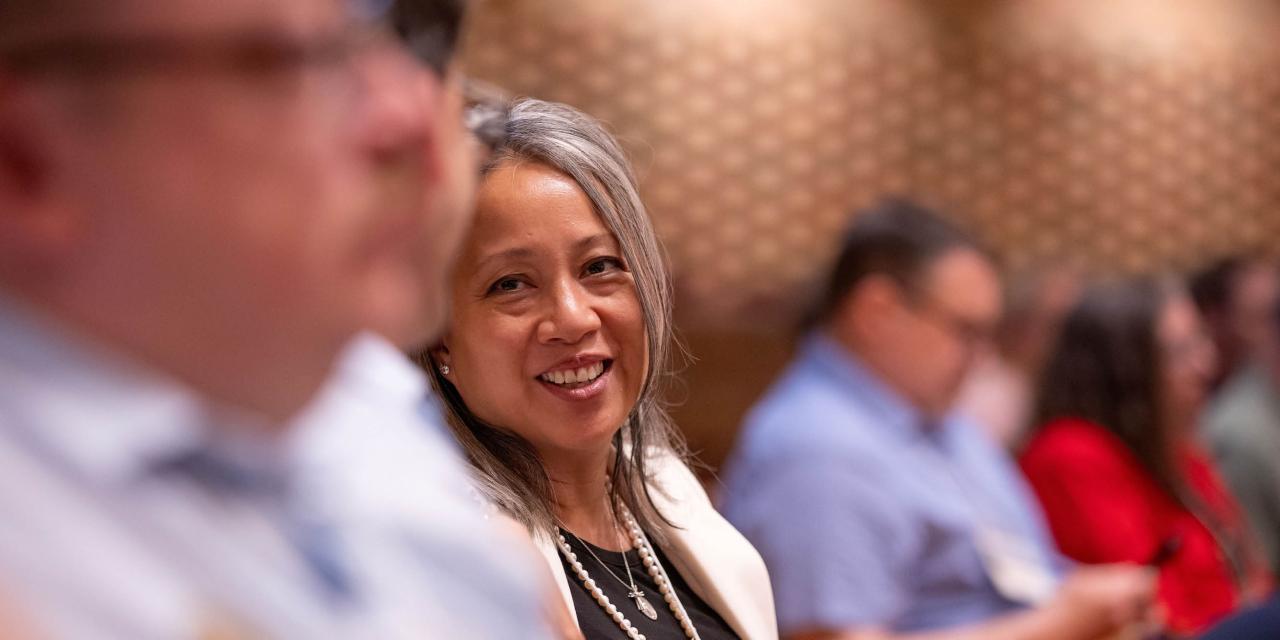
In this Strengthening Preaching blog series, preachers from a range of Christian traditions and denominations reflect on their growth as preachers through their involvement in the Strengthening Preaching initiative of Lilly Endowment Inc., which is coordinated by the Calvin Institute of Christian Worship. At the heart of the initiative are preaching peer groups, sponsored by various seminaries, which engage preachers in reading, discussion, preaching, and feedback—all within a collegial circle of support. Estee Valendy participated in a peer learning group sponsored at Perkins School of Theology.

When I was a teenager, my parents had to drag me to youth group at church. I remember sitting in the back seat of my mom’s minivan in tears because I didn’t want to go inside and face all the other teens. I didn’t feel like I was good at banter, and I hated team games.
Fast forward twenty years, and I’m now a United Methodist minister who still resists peer groups. I serve as co-pastor with my husband, and there are never enough hours in a day to accomplish all the tasks of ministry. Between preparing a weekly sermon, ordering the life of the church, planning and implementing ministries, and responding to pastoral care needs, it seems like my list is always getting longer, not shorter. As a result, participating in a clergy peer group has never been a high priority for me.
Last year, however, I was invited to participate in a preaching peer group through the Center for Preaching Excellence at Perkins School of Theology. At first I went through the usual list of excuses in my head, but the specifics of this invitation softened my resistance. This preaching group was not for remedial preachers, but for those who’d been preaching for a while and who wanted to sharpen their craft. The group would have focused readings that we would discuss together at each gathering. And the invitation came with a clear agenda to keep us on track.
A surprise
As I accepted the invitation and began to meet with this group, one element of our monthly gatherings surprised me. At the beginning of each meeting, we were asked to participate in a check-in time with one another, responding to questions like these: What are you celebrating in life right now? What is draining your energy for ministry? How is it with your soul?
Because this was a group focused on preaching, I imagined that our opening check-in would be perfunctory—that we’d gloss over it to get to the real meat of our time together: the readings, the discussion, the preaching practice. I thought these were the elements that would make me a better preacher.
But as time went on, I was surprised to experience an inversion. The check-in became the most meaningful part of the group for me. Those forty-five minutes we spent sharing with one another about the ups and downs of life in ministry pulled me out of my isolated bubble and opened my eyes to my colleagues, whose daily trials so closely mirrored my own.
The opening check-in not only was normalizing; it also shaped the preaching environment of the peer group. At each meeting, after our check-in and reading discussion, we took turns preaching for one another. We quickly found that providing constructive criticism for our colleagues today is no easier than critiquing peers’ sermons in seminary all those years ago. We want to say something positive and affirming, and we struggle to find helpful words of feedback about where a sermon fell flat.
In our initial gatherings, we used a sermon evaluation form, which resulted in the group saying little and writing much. We made a change midstream, putting down our pens and experiencing each other’s sermons as listeners, not analysts. This change, along with the growing trust we were building through the opening check-in, led to more productive and fruitful feedback sessions following the sermons.
As we became more familiar with the circumstances of each other’s lives, we were better able to recognize sermon content that felt disingenuous or to identify where the passion for a particular idea came from. Our respect and appreciation for one another, fostered through our check-ins, helped us to better speak specific truths to one another in love.
A paradox
As I continued participating in the group, I began to notice small shifts in my preaching. I became less critical of myself during my sermon preparation and spent less time agonizing over what illustrations to use. The monthly readings provided a good refresher on sermon form and structure, and my sermons became tighter and more concise.
However, I see the real fruit of the group not in how my sermon content improved but in the comfort I found with my own style.
It seems paradoxical that a group intended to strengthen my preaching ultimately loosened my need for sermon control, and yet that’s what happened. As preachers, we’re always told that we need to find our preaching voice. I learned that I can discover my voice only when I allow myself to relax into it and not struggle to achieve it.
Because the thing is, my congregation already knows my voice. They hear it when I visit their bedside in the hospital. They hear it when we linger after a meeting to talk about their family member who is struggling. They hear it when they ask me how I’m doing and I honestly answer that I’m exhausted because my kids aren’t sleeping well. That’s the voice that speaks good news in the sermon. Not the voice of knowledge or fancy theology or rhetorical calisthenics, but the voice they already know from their relationship with me.
When I listened to my colleagues preach, it was the authentic voices that were the most compelling—the voices that brought me back to our check-in time, when they shared about their fears and worries, their sorrows and excitement. When their preaching voice resonated from the center of their vulnerable, life-sharing voice, I as a listener felt most engaged and most aware of how the Spirit was moving in my own life.
From my peer group experience, I learned that excellent preaching is fundamentally authentic preaching. I believe the adage “the medium is the message” is true. In my preaching, I want to offer the medium of my struggles and joys as a follower of Christ and be used by the Holy Spirit to share good news with God’s people.
LEARN MORE
Read So Much Better: How Thousands of Pastors Help Each Other Thrive, an examination of the impact of pastor peer groups.
Explore preaching and ministry resources from the Center for Excellence in Preaching.

